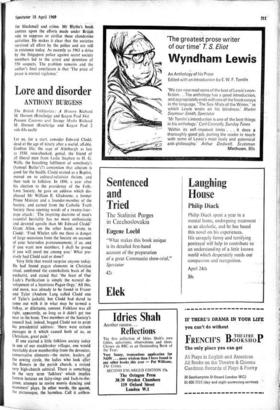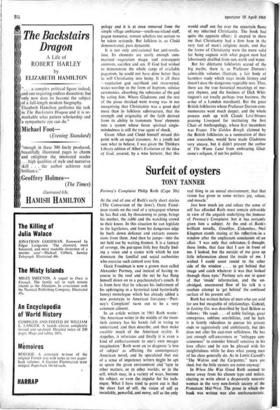Lore and disorder
ANTHONY BURGESS
The British Folklorists : A History Richard M. Dorson (Routledge and Kegan Paul 84s) Peasant Customs and Savage Myths Richard M. Dorson (Routledge and Kegan Paul 2 vols 63s each) Let us, for a start. consider Edward Clodd, dead at the age of ninety after a useful, affable, Godless life; the sage of Aldeburgh as late as 1930, rose-cheeked, genial, the friend of all liberal men from Leslie Stephen to H. G.
Wells, the breathing fulfilment of somebody's (Samuel Butler's?) contention that atheism is good for the health. Clodd started as a Baptist, moved on to cultural-relativist theism, and then took to folklore. In 1896, a year after his election to the presidency of the Folk-
Lore Society, he gave an address which dis- pleased Mr William E. Gladstone, a former Prime Minister and a founder-member of the Society, and earned from the Catholic Truth _ Society these opening words of a twenty-four- page attack,:, 'The inspiring doctrine of man's essential .bestiality has no more enthusiastic and devoted apostle than Mr Edward Clodd,' Grant:, Allen,. on the other hand,. wrote.. to Clodd: 'Fred Whelen tells me there is danger of large secessions from the Society on account of your heterodox pronouncement; if so, and if you want new members, I shall be proud if you will enrol me among you.' What pre- cisely had Clodd said or done?
Very little that would surprise anyone today. He had found pagan elements in Christian ritual, confirmed the cannibalistic basis of the eucharist, and stated that 'the feast of Our Lady's Purification is simply the natural de- velopment of a licentious Pagan Orgy.' All this, and more, was already to be found in Frazer and Tylor (Andrew Lang called Clodd one of Tylor's jackals), but Clodd had dared to come out with it in what may be termed a folksy, or dilettante, context. Folklore was all right, apparently, so long as it didn't get too near to the bone. Two members of the Society's council had, indeed, begged Clodd not to print his presidential address: 'there were certain passages in it which caused both of us, as Christians, great pain.'
If one started a little folklore society today in one of our stockbroker villages, one would inevitably draw membership from the devouter, conservative elements—the rector, leaders pf the sewing circle, the ladies who look after the flowers in the parish church, a retired very high-church admiral. There is somethiv in the very term 'folklore' which implies lantern lectures on fairy-rings and Jack-in-the- green, attempts to revive morris dancing and mummers' plays. In other words, the quaint, the picturesque, the harmless. Call it anthro-
pology and it is at once removed from the simple village ambiance—south-sea-island stuff, pagan nonsense, remote scholars too serious to be taken seriously. But folklore is, as Clodd demonstrated, pure dynamite.
It is not only anti-rational but anti-revela- tion. Its elements are easily enough sum- marised—vegetation magic and consequent animism, sacrifice and sex. If God had wished to demonstrate the whole range of available paganism, he could not have done better than to will Christianity into being. It is all there —vegetation god sacrificed and resurrected, water-worship in the form of baptism, solstice ceremonies, absorbing the substance of the god by eating him. Where Gladstone and the rest of the pious shocked went wrong was in not recognising that Christianity was a good deal more than its folkloric substructure, that the strength and originality of the faith derived from its ability to transmute 'base' elements into a system whose fierce spiritual single- mindedness is still the true agent of shock.
Grant Allen and Clodd himself missed this point with an equal crassness. As a youth not sure what to believe, I was given the- Thinkers Library edition of Allen's Evolution of the Idea of God, assured, by a v✓ee lecturer, that this
would snuff out for ever the uncertain flame of my inherited Christianity. The book had quite -the opposite 'effect: it seeped to show me that, Christianity had a firm base in the very fact of man's- religious needs, and that the forms of Christianity were the more valid for being cognate with what pagan man had laboriously distilled from sun, earth and water.
But for dilettante folklorists scared of the big myths, there is, as Professor Dorson's admirable volumes illustrate, a fair body of harmless study which stays inside history and doesn't dare the dangerous vegetable seas. Thus, there are the true historical meanings of nur- sery rhymes, and the business of Dick Whit- tington's cat (really perhaps true business, the achat of a London merchant). But the great British folklorists whom Professor Dorson com- memorates went much deeper, and the whole process ends up with Claude Levi-Strauss praising Liverpool for instituting the first Chair of Anthropology, whose first incumbent was Frazer. The Golden Bough, claimed by the British folklorists as a summation of their own researches, would have made Gladstone very uneasy, but it didn't prevent the author of The Waste Land from embracing Glad- stone's religion, if not his politics.











































 Previous page
Previous page